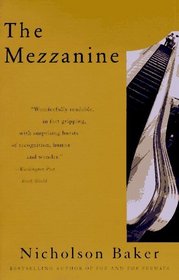Helpful Score: 7
Interesting book. The author somehow manages to make the most mundane things interesting again. From simple cardboard milk cartons, shoelaces, to elevators. He manages to breath new life into everyday objects and makes you see them in a whole new light.
Helpful Score: 2
The book starts off very quirky and funny. By the end of the book I was ready for it to be over with and started skimming. The footnotes on the pages are also fun at first, but become more of a hassle when they run onto more than one page and you have to come back to read the information.
Helpful Score: 1
I'm not at all sure what to make of this one.
Is it philosophy? It examines the meaning of life through the study or our simple, daily activities and thoughts, so perhaps.
Is it humor? It clearly points out some of the oddities of human nature in ways that make the reader laugh, or at least crack a smile.
Is it satire? Certainly some bits - like the long footnote about footnotes - can be thought of that way.
Is it meditation? Nothing "of the world" discussed here is particularly important, and yet, something about the presentation makes the whole something greater than the sum of its parts.
Is it some kind of high art? Well, maybe, but I'm not sure I could defend that description.
In my opinion, The Mezzanine is a novel written in the style of Jerry Seinfeld, only extended. Seinfeld's comedy has been described to me as being "about nothing", or at least about nothing important.
The Mezzanine - in which the entire plot revolves around the author's thinking over one escalator ride, with extensive diversions into things related to those thoughts - is Seinfeld's comedy on steroids.
Instead of a few lines about broken shoe laces, we get whole pages with footnotes and later references. We get an interesting discussion of the frequency of the author's thoughts about various topics, and the idea of comparing that data with similar charts for others. We get expositions on cashier efficiency and polishing the handrails of escalators. In all, it's a disordered and unrelated group of chapters, very loosely bound together by the author's occasional reference to his return from lunch.
But in the process of writing these un- (or barely) related blurbs we actually examine the way people think. There is amusement, at a minimum, in these pages as a result.
In all honesty I don't know that I learned from The Mezzanine. I already assumed that everyone had crazy thought patterns similar to my own, but different in their specifics. Still, I did enjoy it. Recommended.
Is it philosophy? It examines the meaning of life through the study or our simple, daily activities and thoughts, so perhaps.
Is it humor? It clearly points out some of the oddities of human nature in ways that make the reader laugh, or at least crack a smile.
Is it satire? Certainly some bits - like the long footnote about footnotes - can be thought of that way.
Is it meditation? Nothing "of the world" discussed here is particularly important, and yet, something about the presentation makes the whole something greater than the sum of its parts.
Is it some kind of high art? Well, maybe, but I'm not sure I could defend that description.
In my opinion, The Mezzanine is a novel written in the style of Jerry Seinfeld, only extended. Seinfeld's comedy has been described to me as being "about nothing", or at least about nothing important.
The Mezzanine - in which the entire plot revolves around the author's thinking over one escalator ride, with extensive diversions into things related to those thoughts - is Seinfeld's comedy on steroids.
Instead of a few lines about broken shoe laces, we get whole pages with footnotes and later references. We get an interesting discussion of the frequency of the author's thoughts about various topics, and the idea of comparing that data with similar charts for others. We get expositions on cashier efficiency and polishing the handrails of escalators. In all, it's a disordered and unrelated group of chapters, very loosely bound together by the author's occasional reference to his return from lunch.
But in the process of writing these un- (or barely) related blurbs we actually examine the way people think. There is amusement, at a minimum, in these pages as a result.
In all honesty I don't know that I learned from The Mezzanine. I already assumed that everyone had crazy thought patterns similar to my own, but different in their specifics. Still, I did enjoy it. Recommended.
Helpful Score: 1
Baker's irresistibly readable short novel presents the quirkyand often hilariousinner life of a thoroughly modern office worker. With high wit and in precisely articulated prose, the unnamed narrator examines, in minute and comically digressive detail, the little things in life that illustrate how one addresses a problem or a new idea: the plastic straw (and its annoying tendency to float), the vacuous ci vilities of office chatter, doorknobs, neckties, escalators and the laughable evolution of milk deliveryfrom those old-fashioned hefty bottles to the folding carton. Using the keenly observed odds and ends of day-to-day consciousness, Baker allows his narrator to re-create the budding perceptions of a child facing a larger mysterious world, as each event in his day conjures up memories of previous incidents. Through the elegant manipulation of time, and sharp, defining memories of childhood, the narrator dissects each item of apparent cultural flotsam with the thoroughness of a prosaic, though wacky, technical manual. The rambling "footnotes" alone are worth the price of this cheerfully original novel.




